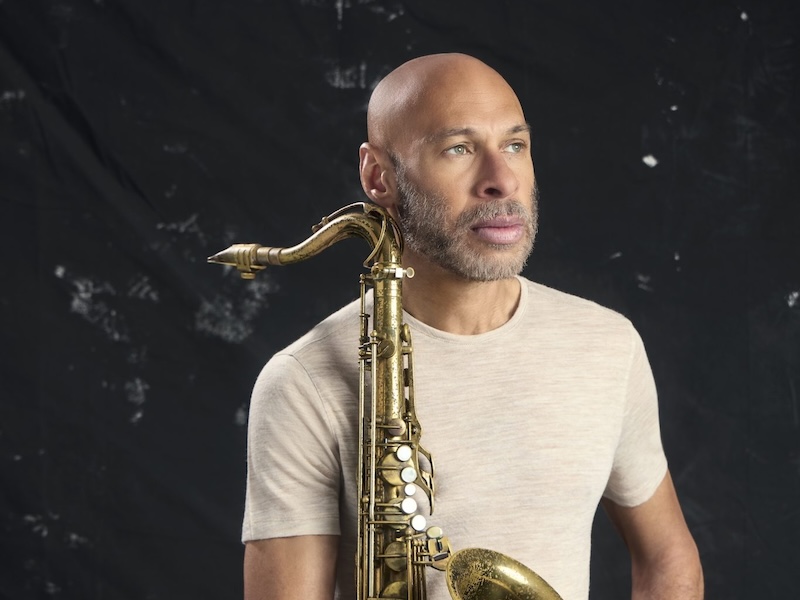
JOSHUA REDMAN QUARTET
September 25, 2025
Doors: 7:30 PM / Show: 8:00 PM
Buy Tickets$49 - $89
September 26, 2025
Doors: 7:00 PM / Show: 7:30 PM
Buy Tickets$54 - $89
September 26, 2025
Doors: 9:15 PM / Show: 9:30 PM
Buy Tickets$54
Joshua Redman is one of the most acclaimed and charismatic jazz artists to have emerged in the decade of the 1990s. The early influences of John Coltrane, Ornette Coleman, Cannonball Adderley, and his father, Dewey Redman, as well as The Beatles, Aretha Franklin, the Temptations, Earth, Wind and Fire, Prince, The Police, and Led Zeppelin drew Joshua more deeply into music. Although he loved playing the saxophone, academics were always his first priority, and he never seriously considered becoming a professional musician. After graduating from Harvard College with a B.A. in Social Studies, he had already been accepted by Yale Law School, but deferred entrance for what he believed was only going to be one year to join friends in Brooklyn. Redman almost immediately he found himself immersed in the New York jazz scene. In November 1991, five months after moving to New York, Redman was named the winner of the prestigious Thelonious Monk International Saxophone Competition.
Joshua Redman Quartet | Words Fall Short
Joshua Redman acknowledges that the title of his new Blue Note album, Words Fall Short, could be viewed ironically. His previous and widely acclaimed where are we was his first to pair a vocalist with one of his many monumental Quartets; yet Words Fall Short is anything but a comment on the saxophonist’s last triumph. More accurately, his latest offering is an organic next step, a collection of previously unheard originals brought to life by inspiring new collaborators. “It’s impossible for me to will a project into being,” he says of the wide-ranging adventures he has embarked upon in what is now his fourth decade as a recording artist. “This album came out of a working environment that inspired me to dig into compositions that hadn’t found a home yet.”
The process began as the first leg of Redman’s where are we tour concluded and pianist Aaron Parks, bassist Joe Sanders, and drummer Brian Blade each left to honor other commitments. In building a new rhythm section, Redman found himself drawn to younger players he had recently encountered. Bassist Philip Norris and drummer Nazir Ebo came aboard first, and Redman quickly knew he had made the right moves. “Not since Christian McBride can I recall experiencing an acoustic jazz bassist who seemingly has it all together at such a young age,” he says of Norris, “and Nazir has groove in spades, a groove that is super-flexible, in the flow of the moment, and with an innate sense of architecture that always serves the song.” By the summer of 2023, pianist Paul Cornish had completed the quartet’s transformation. “Paul is the perfect balance of empath and contrarian, challenging everyone to break away from established patterns, while still always making the music feel good and natural in the moment.”
As the new quartet performed steadily over the next several months, Redman felt a vibe developing, one brought to fruition by a stack of music the saxophonist created during the pandemic. “My dry writing periods lead me to question whether I’m really a ‘Composer,’’’ he confesses. “I might not have a gig for months, but I touch my horn every day. I don’t compose regularly, but during the pandemic I had nothing but time to develop ideas… Still, until I can play a tune with other human beings, it remains more theory than a reality.”
Redman’s unheard new music made the transition in September 2024, when his new quartet had logged almost a year of performances. “We were at a soundcheck, and I decided to try one of the tunes. It felt good, and I said, ‘Let’s try another.’ After we ran through maybe three more in ten minutes, I realized that we were ‘ready.’”
Cornish, Norris, and Ebo impress on each of the album’s eight tracks. While they have moments to emerge and take the spotlight, they also provide a distinctive ensemble personality, one in which spontaneity and sensitivity keep the music fluid yet coherent. They are a rhythm section with character, one in sync with the priorities of their leader. “My approach to bandleading is unchanged,” Redman says. “Play with the best musicians I can find, virtuosos who have mastered all the different jazz vocabularies, but who are also great listeners and collaborators — who know how to express their individual brilliance through group improvisation and collective interaction.”
That description applies equally well to the guest artists heard on three tracks. Two of those, “So It Goes” and “Icarus,” grew out of Redman the Composer’s desire to give each piece added depth. “I was sort of struggling with the melody to ‘So It Goes’” he says of the track featuring saxophonist Melissa Aldana, “and immediately thought of Melissa, who has such a gift for lyrical expression… the way she uses breath and air and contour to really give melodies shape and make them come alive… I sent her the tune… and once I knew she was game, I began to rethink the overall approach as more conversational.” As to the misguided perception that any encounter between two tenors is a ‘battle,’ he adds that “I’ve never been a fan of that sort of thing. I realize of course that it’s part of the so-called ‘tradition.’ So, yeah, I’ll bring my axe if I must, but I prefer to come in peace!… I really feel like what Melissa and I created here is the antithesis of conflict.”
Redman first heard trumpeter Skylar Tang — who is featured on the funky, nine-meter “Icarus” — when she was just a sophomore in high school. “She had huge ears,” he recalls, “and she already had tremendous patience, a deep maturity and sensitivity… Every note had a meaning.” Tang is now a student in a joint Columbia University/Julliard School program. When Redman invited her to attend a soundcheck before the quartet’s Jazz at Lincoln Center concert, he texted her the sheet music for “Icarus” on a whim the night before. “She came in the next day with the whole thing memorized… She played it perfectly… and sounded like she understood the song better than I did! Once again I heard how that melody benefitted from the presence of another voice, and we recorded it with her a few weeks later.”
The final track, “Era’s End” (a lyrical recasting of the instrumental album-opener “A Message To Unsend”), finds vocalist Gabrielle Cavassa matching her stunning contribution to where are we on only the second recorded composition with both words and lyrics by Joshua Redman. “Writing lyrics is tough,” he emphasizes, “and I can’t be satisfied until someone like Gabrielle convinces me that they work. I said ‘never again’ when I finished writing ‘After Minneapolis’ for the last album, and that was clearly not the case… I could tell early on as the music for ‘Era’s End’ emerged that it would not be a walk in the park, and then the lyrics that followed were just so dark… but Gabrielle’s gift for expressing melancholy really found the beauty (and perhaps also the hope) in the tune’s darkness. Maybe the lyrics describe the end of a love affair… Maybe they are a metaphor for another sort of loss or mourning or resolution…”
Several of the titles are borrowed from passages Redman admires in books by Cormac McCarthy (“Borrowed Eyes”), W.G. Sebald (“Over the Jelly-Green Sea”) and Kurt Vonnegut (“So It Goes”). The album’s title track is taken from Yiyun Li’s PEN/Jean Stein Award winning Where Reasons End. “The novel is short and incisively beautiful, a conversation the author imagines with a son who recently committed suicide,” Redman explains. “She grapples with language and how to understand the incomprehensible; and at the end she tells her son that ‘Words fall short, yes, but sometimes their shadows can reach the unspeakable.’ That’s also true of notes, of ideas, of actions… Any attempt to express our meanings and feelings will never fully succeed, as perfection is unattainable. But it’s that struggle, that fallibility, that makes us so marvelously and exquisitely human.”
For Joshua Redman, the shifting moods of wistfulness, aspiration, sadness and resolve contained in Words Fall Short signify his embrace of what he describes as “the beauty of human imperfection. We face huge questions about what our future looks like,” he stresses, “and a mathematical approach to language has even left us questioning what it means to be ‘intelligent’ or ‘productive’ or ‘creative.’ At heart I’m a humanist, and I believe in the shadows of the words, the things you can’t crunch with technology.” Words Fall Short is Redman’s latest exploration of the words — and the shadows.
SHARE THIS:
